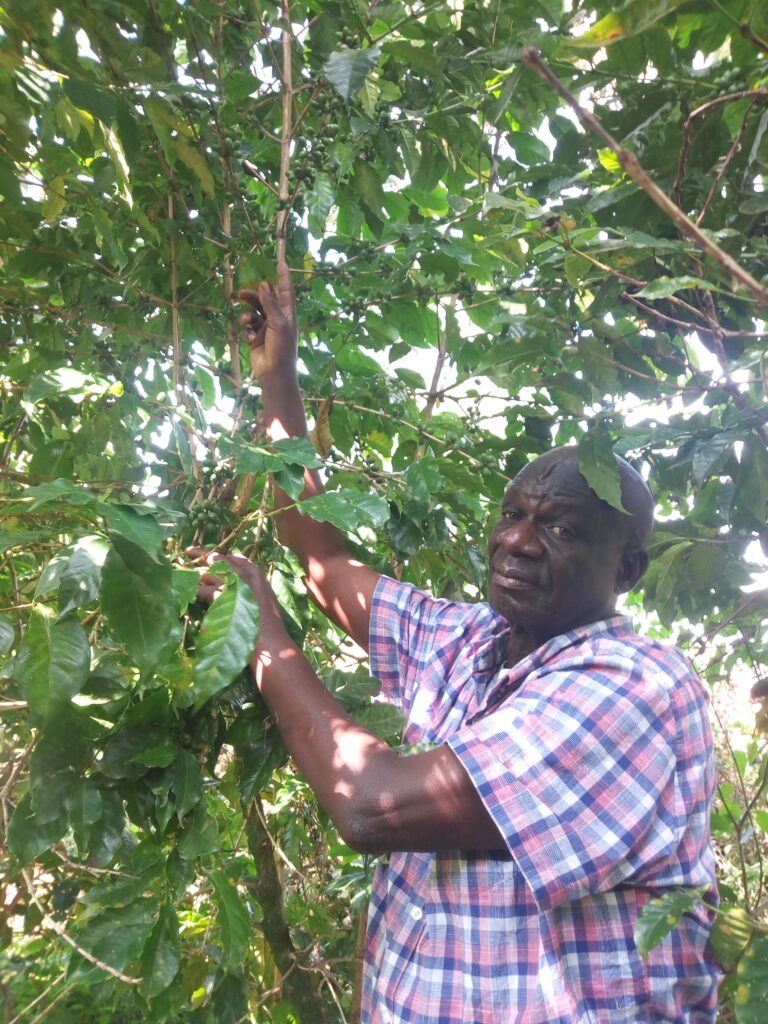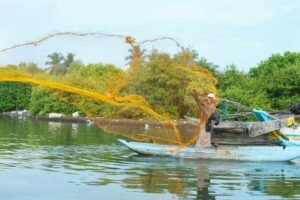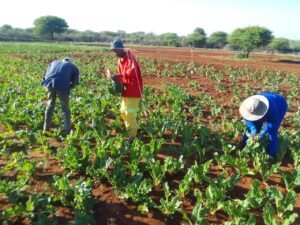By Zablon Oyugi, June 12, 2025, At a time most coffee farmers in Kenya rely on synthetic fertiliser and chemicals pesticides to produce the high value commodity, a farmer from Migori County in western Kenya—a renowned sugar belt region—is growing the crop organically, a move that earns him an edge in the market over his peers.
Mr. Caleb Odondi Omollo says he sells a 50kg of AA grade of coffee at not less than Sh40,000 directly to buyer when other farmers rely on brokers to sell their produce at the ever fluctuating market prices.
“I sell the least grade at Sh7,000 per 50kg and rarely facing market challenges as my produce are normally bought on order,” he said.
Caleb says his coffee bushes are food forests he designed in three years with permaculture concept he learnt during his education, work and stay in New Jersey, United States between 1981 and 2008 when he returned to Kenya.
He has planted, within his coffee trees, avocado, mango, banana, guava, mulberry, and loquats fruit trees in addition to croton megalocarpus, macadamia, glycerin, and acacia spectabilis among other indigenous trees which provide shade for the coffee plants.
The fallen and decaying leaves of these plants form hips of humus on the farms. Creeping cover crops such as pumpkin leaves also make the ground beneath the crops impenetrable for weeds.
“This approach was to create a natural environment which balances itself,” said Caleb who is also a regenerative agriculture expert from Southern California-based Quail Springs educational school.
“The tall trees create tunnels for the sun penetration to short plants for their photosynthesis enabling the microorganisms in the soil like the fungi to get carbon for their survival and instead facilitate nutrients from the soil to the plants. We also have the nitrogen fixers like lucerne trees that enrich the soil with the beneficial component for plats growth,” he added.
His farm is a complete ecosystem with preys and predators. Snakes, for instance, eat birds’ eggs, birds eat insects which feed on other parasite insects while hawks prey on snakes and so on said the 65 years old Bachelor of Arts in Environmental Ecology from State University of New York.
Coffee production
Caleb established his organic coffee farm of 10 acres in 2011 with 775 mature tree and 2,500 young ones of different coffee varieties (K7, Mbatiani, Ruiru 11, SL28 and blue mountain) he bought from Coffee Research Institute centres in Kisii and Koru.
Through his organic approach, a tree currently gives him between 10-15kg per season translating to over 1000kg per season since his mixed varieties mature and yields differently.
He has since installed a pulping machine which can process up to 1000kg of cherries a day as he sources some from his fellow nearby farmers drawn from Rongo Organic Coffee Farmers Group whose members are also growing the crop organically.
“After fermenting, drying the coffee on metallic racks, and milling at a company in Kisii County, I typically obtain 450kg of AA, AB, and C grades from 1,000kg of raw beans,” said Caleb.
For him to meet the acceptable 1000kg by millers, Caleb works with fellow farmers from the area who also practice organic coffee farming to process and aggregate their produce for the market.
He says Mbatiani and Ruiri 11 varieties are currently the most productive though farmers also do SL28 and K7 because they have high flavour.
Regenerative agriculture
Caleb has since transitioned fully into regenerative agriculture which involves restoring degraded farmland through improving soil health.
“Coffee grown as a monoculture demands intensive chemical inputs, which not only pose risks to human health and the environment but also degrade soil quality. These chemicals kill beneficial microorganisms essential for maintaining soil structure, gradually depleting the soil and rendering it unsuitable for cultivation over time,” said Caleb.
He says he got the idea from reading media reports which highlighted certain instances where some produce were banned in the export market due to heavy chemical usage.
With this new farming method birds and beneficial insects prey on nematodes and arthropods that suck coffee nutrients. This is besides the forest environment making the ground too cold for the parasites to breed.
This has made his production even affordable and sustainable as he uses household and farm wastes to make compost manure which is bio complete good for rejuvenating the soil.







